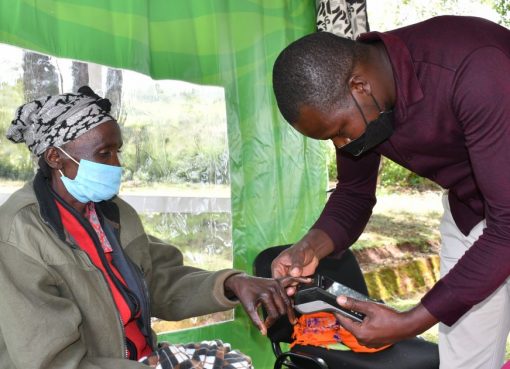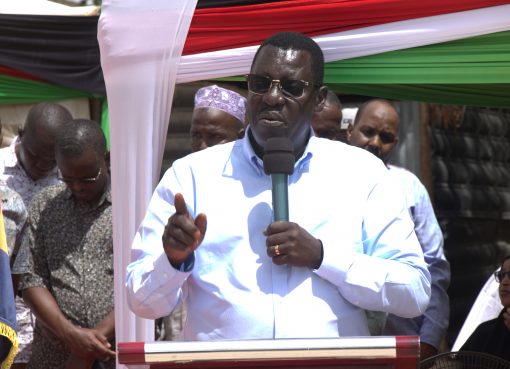Farmers in Nakuru County have been supplied with over six tons of certified potato seeds to boost production.
Governor Lee Kinyanjui said more than 20 groups of farmers specializing in potato production in Kuresoi South, Molo, Kuresoi North, Bahati, Gilgil and Njoro Sub-Counties have been identified for the seeds that are being issued at no cost to the farmer.
In a press briefing, Mr Kinyanjui stated that the devolved unit was the second largest producer of the crop in the country.
He was flanked by County Executive Committee Member for Agriculture Dr. Immaculate Maina and Potato Liaison Officer, Ms Lynnette Echessa.
Farmer Groups from Molo and Kuresoi North Sub-Counties received the Kenya Karibu variety while those in Bahati, Gilgil and Njoro Sub-Counties were supplied with the Dutch Robin variety.
“Scarcity of certified potato seeds in Kenya has stagnated production of the crop at seven tons per hectare against a potential of 40 tons.
Only one per cent of potato farmers in the country use official seeds with the rest using recycled seeds from their farms and the informal sector thereby leading to low production of the crop,” he pointed out.
According to the Ministry of Agriculture, Fisheries, Livestock and Cooperatives, Kenya’s potato seed demand stands at 30,000 tonnes annually but the country only produces 6,700 tonnes with most farmers recycling previous crop to use as seed, a move that has been blamed for the shortage that the country faces.
The report indicates that Kenya produces about two million tonnes of potatoes annually even though the country has potential of yielding up to eight million tonnes.
Mr Kinyanjui said the devolved unit was working with various government agencies, research institutions and farmer groups in promoting new farming technologies for breeding multiple disease-free and high yielding seed as a way of unlocking the over Sh15 billion potential of potato farming in the devolved unit.
“We are closely partnering with the Kenya Plant Health Inspectorate Service (KEPHIS), Agriculture Development Corporation, Egerton University, Baraka Agricultural College and Kenya Agricultural and Livestock Research Organization (KALRO) in encouraging both small holder and large-scale farmers to adopt aeroponics, hydroponics and apical stem cutting technologies used to produce basic potato seed,” said the Governor
Dr. Maina noted that Irish potato (Solanum tuberosum) is the second most important food crop in Kenya, after maize.
She observed that due to low multiplication rates, it takes seven seasons of seed production before a farmer can afford certified seed.
“The potato can provide cheap and nutritionally rich staple food requirements for the country’s fast-growing population, especially, since the main staple food, maize, has its yields declining due to a host of factors including Maize Lethal Necrosis Disease, increasing soil acidity and changing land use patterns.
Certified seed will help farmers to increase their incomes through high yields and early maturity of the crop. The varieties that the groups have received are disease and pest resistant and drought tolerant,” added Dr. Maina.
Ms Echessa advised potato farmers to take soil samples for testing and analysis to ascertain nutrient requirements and presence of diseases.
She said in the past decade production of food crops in the country had been declining as farmers have been using fertilizers without changing formulations and with no regard for soil type and status.
“Most of our soils, particularly in the potato and maize growing belt, cannot support the growth of plants sustainably and give desired yields.
“To achieve food nutrition and security Kenyans have to remove guesswork from farming by encouraging soil testing, the production and application of fertilizer guided by the test results,” stated the Liaison Officer
Ms Echessa indicated that other challenges facing the potato sub-sector included inadequate research and development, low productivity, weak research-extension-farmer linkages, low level of value addition, poor market infrastructure and lack of a national policy.
The top producing potato counties are Nyandarua (29.8 per cent), Nakuru (18.9 per cent) and Elgeyo Marakwet (16.2 per cent). Other potato producing regions include Makueni, Meru, Embu, Nyeri, Tharaka-Nithi, Samburu, Kajiado and Kwale. Kiambu, Taita Taveta, Nakuru, Narok, Bomet, Trans Nzoia, Uasin Gishu and West Pokot also register significant yields.
Countrywide, the crop is grown by 600,000 to 800,000 farmers with a total production of 1 to 1.4 million tonnes worth Sh30 to Sh40 billion per year. Small scale farmers contribute 83 per cent of the total production.
The potato sub sector supports 3.8 million people directly and indirectly with the National Potato Council of Kenya putting its worth at over Sh50 billion.
By Jane Ngugi and Hellen Kivaya




